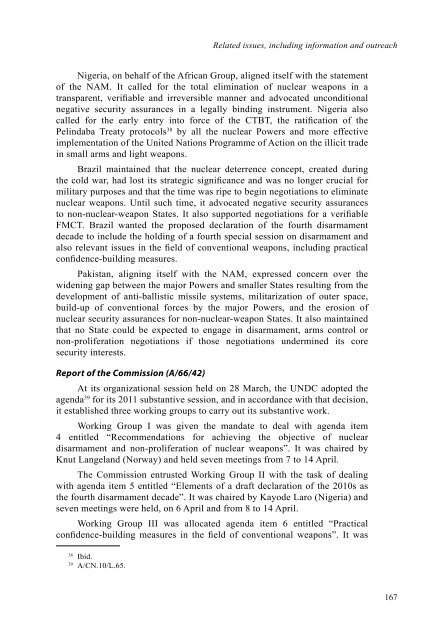DYB2011-Part-II-web
DYB2011-Part-II-web
DYB2011-Part-II-web
Create successful ePaper yourself
Turn your PDF publications into a flip-book with our unique Google optimized e-Paper software.
Related issues, including information and outreach<br />
Nigeria, on behalf of the African Group, aligned itself with the statement<br />
of the NAM. It called for the total elimination of nuclear weapons in a<br />
transparent, verifiable and irreversible manner and advocated unconditional<br />
negative security assurances in a legally binding instrument. Nigeria also<br />
called for the early entry into force of the CTBT, the ratification of the<br />
Pelindaba Treaty protocols38 by all the nuclear Powers and more effective<br />
implementation of the United Nations Programme of Action on the illicit trade<br />
in small arms and light weapons.<br />
Brazil maintained that the nuclear deterrence concept, created during<br />
the cold war, had lost its strategic significance and was no longer crucial for<br />
military purposes and that the time was ripe to begin negotiations to eliminate<br />
nuclear weapons. Until such time, it advocated negative security assurances<br />
to non-nuclear-weapon States. It also supported negotiations for a verifiable<br />
FMCT. Brazil wanted the proposed declaration of the fourth disarmament<br />
decade to include the holding of a fourth special session on disarmament and<br />
also relevant issues in the field of conventional weapons, including practical<br />
confidence-building measures.<br />
Pakistan, aligning itself with the NAM, expressed concern over the<br />
widening gap between the major Powers and smaller States resulting from the<br />
development of anti-ballistic missile systems, militarization of outer space,<br />
build-up of conventional forces by the major Powers, and the erosion of<br />
nuclear security assurances for non-nuclear-weapon States. It also maintained<br />
that no State could be expected to engage in disarmament, arms control or<br />
non-proliferation negotiations if those negotiations undermined its core<br />
security interests.<br />
Report of the Commission (A/66/42)<br />
At its organizational session held on 28 March, the UNDC adopted the<br />
agenda39 for its 2011 substantive session, and in accordance with that decision,<br />
it established three working groups to carry out its substantive work.<br />
Working Group I was given the mandate to deal with agenda item<br />
4 entitled “Recommendations for achieving the objective of nuclear<br />
disarmament and non-proliferation of nuclear weapons”. It was chaired by<br />
Knut Langeland (Norway) and held seven meetings from 7 to 14 April.<br />
The Commission entrusted Working Group <strong>II</strong> with the task of dealing<br />
with agenda item 5 entitled “Elements of a draft declaration of the 2010s as<br />
the fourth disarmament decade”. It was chaired by Kayode Laro (Nigeria) and<br />
seven meetings were held, on 6 April and from 8 to 14 April.<br />
Working Group <strong>II</strong>I was allocated agenda item 6 entitled “Practical<br />
confidence-building measures in the field of conventional weapons”. It was<br />
38 Ibid.<br />
39 A/CN.10/L.65.<br />
167


